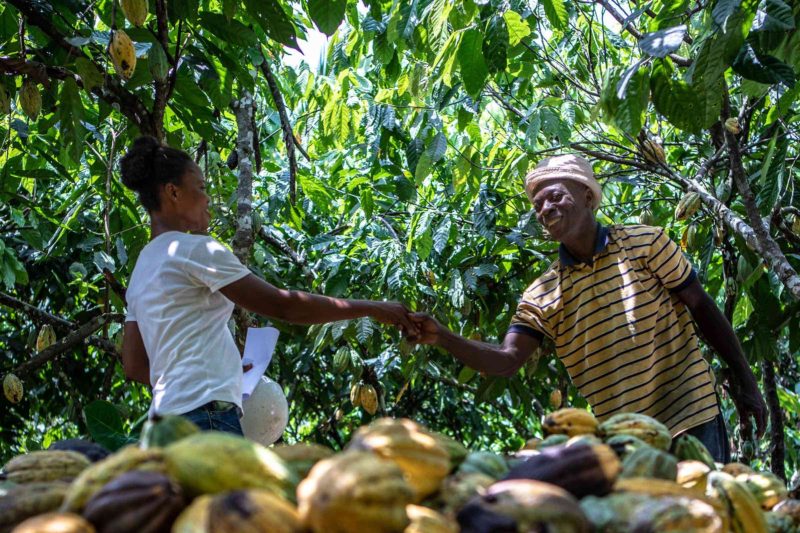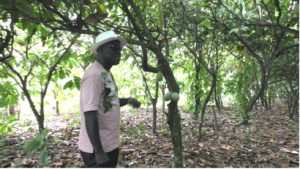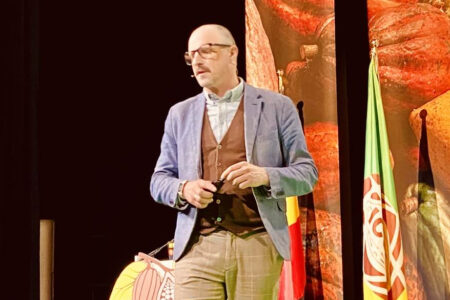Fairtrade farmers renew pleas to COP26 global leaders in driving climate change

Smallholder farmers in West Africa should be part of the climate solutions, says Fairtrade (pic, Ben Rotthoff, Koa)
A senior Fairtrade Africa cocoa farmer delegate has urged world leaders gathering for the COP26 environment conference to deliver direct solutions to a ‘dire situation’ for key supply chain communities affected by climate change, reports Neill Barston.
Speaking to Confectionery Production, Kouame N’dri Benjamin-Francklin, representing Fairtrade Africa producers in Ivory Coast and the West Africa Network (WAN), expressed severe concern at the situation within his own region. He offered an exclusive video interview with us ahead of the key international eco-summit that is hoped will drive genuine legislative improvements.
“For us producers, the opportunity to be at COP26 is very timely, as the situation has become very dire for small producers. We are very hopeful that we will have the chance to speak to global leaders about our situation,” reveals the experienced farmer, ahead of the COP26 event beginning in Scotland this weekend.
As we recently reported, the cocoa sector in West Africa has been impacted notably by both the knock-on effects of the Covid-19 crisis, as well as fluctuating commodities prices, that has seen the value of crops drop steeply in recent months, against a picture of inconsistent demand. Harvests have also been affected by unpredictable weather patterns, which have also been linked to the affects of climate change.
Consequently, Fairtrade and the Fair Trade movement have planned a strong presence in Glasgow championing the rights of farmers and agricultural workers through a series of initiatives comprising a global petition demanding climate funding for farmers and a Fairtrade Youth Ambassador campaign to advocacy efforts with global leaders and their delegations.
Benjamin-Francklin (pictured below) continued: “We’re looking for change in climate legislation, we want these world leaders to adhere to the promises and protocols that have been made on climate change. This includes promises to help make farmers resilient and adopt new agricultural methods and technology. On legislation, laws must establish what each actor in the supply chain must do, we producers are doing our part, and we want all those who are at the helm of affairs to also take action.
“As a result of Fairtrade, I have been able to diversify into bananas and rice. Because of climate change, we don’t know when the rains will come, but it’s now that the rains are coming, so it’s very difficult to plan anything.

“We also have the heat and our soils are devastated, the soil quality is poor. I have a farm between the forest and savannah regions, and the trees are disappearing. The situation of climate change is really hitting us. But we as producers and cooperatives, have joined with Fairtrade. As a result of this association, we’re receiving some training that is helping us to adapt and be resilient. As I speak to you now, we have some of our producers that we are giving seedlings to in order to service afforestation. We are also giving training how to fix soils with enriching them through nutrients, explained the delegate, who says that he remained hopeful that legislative change may potentially be achieved at COP26.
However, he remained extremely concerned regarding the state of many of the communities in his home country, which he revealed were experiencing particular hardships that were closely linked to environmental impacts.
As Confectionery Production previously revealed, the region’s recently introduced Living Income Differential scheme, a $400 a tonne payment paid directly to farmers aimed at raising their living standards out of poverty conditions, has been affected by the downward spiral of cocoa prices. Consequently, the country’s government decided to reduce the farmgate price paid to agricultural workers, which effectively negates any positive benefit of the LID scheme, leaving those workers, many of whom earn less than $1 a day, well below UN defined levels of poverty.
“In our cooperatives, we have women, youths and adults. Our women are very enterprising in the sense that they are diversifying into other produce they sell on the local market. But I’m afraid for them, as because of climate change, there may be no future for farming. I fear that there’s also a high risk that young people would not like to go into agriculture for the future, so we are making an urgent appeal to all other actors to invest in resilience, agriculture and technologies that can sustain our sector. As for next year, we are not sure how climate conditions will affect our production and revenues.
“We as producers are contributing already towards climate change, and through our activities we are helping to preserve the ecology. So we want global leaders to respect what we bring to the table, and those who want to engage them, to invest in food security for the future. Our culture is important, our production is important. If you look at any table around the world, consider that it is agricultural produce that it is on there. So that tells you, that we producers are ready to nourish the world, to provide food security, so we want support to be able to do that. We want our youth to live. We are making this appeal strongly to those who matter, I am very passionate about this, because the future is now. We have to act now.”

Major Fairtrade study
As previously reported, his attendance at the COP26 event comes as the Fairtrade organisation has placed a petition to the COP26 event on behalf of 1.8 million farmers around the world with which it works, and also produced a new study underscoring the severity of the situation for many key producing regions.
It was compiled by researchers from The Vrije University Amsterdam and Bern University of Applied Sciences, painting an extremely challenging future for some of the world’s most beloved commodities, including bananas, coffee, and cocoa, and explicitly identifies how climate change will impact specific crops and regions in different ways.
The study, which was supported by funding from the European Union, suggests that millions of farmers could be at risk of financial collapse as their livelihoods come under increasing climate pressure.
“The report’s results are extremely alarming and a clarion call for immediate and comprehensive climate action,” warned Dr. Nyagoy Nyong’o, Global CEO at Fairtrade. “The threat to the future of many supply chains is very real and our planet’s farmers and agricultural workers are on the frontline of this global climate crisis. We must do everything to ensure they are not left behind and that they are indeed a part of the solution.”
According to the study’s findings, dramatic weather patterns spurred by climate change will likely deliver severe blows to agricultural production in key regions around the world, from Latin America to the Asia-Pacific. Banana producers in the Caribbean and in Central America, for instance, are expected to face less rainfall and more extreme temperatures, while those in Southeast Asia and Oceania will see an increased risk of tropical cyclones.
Meanwhile, in the Dominican Republic and Peru, as well as in parts of West Africa, cocoa farmers are likely to encounter more hot and dry weather periods, while their counterparts in eastern Ghana and northern Côte d’Ivoire may face heavier rains.
Other Fairtrade products are at risk too, according to the study. Sugarcane producers in Southeast Asia may face increasing drought and heat stress. Similar conditions could soon afflict tea production in Asia and Africa as well, with producers across Asia and in Malawi and Tanzania predicted to be most severely impacted.



